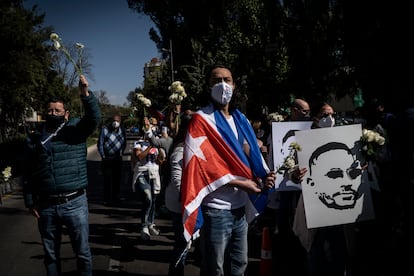Cuba to release more than 550 prisoners after talks with Vatican
Havana announced the decision after Washington said that it was removing Cuba from its list of state sponsors of terrorism


Cuban President Miguel Díaz-Canel announced on Tuesday that his government will release 553 prisoners following discussions with the Vatican. This announcement comes just hours after the Biden administration revealed plans to remove Cuba from the list of state sponsors of terrorism, a list that includes countries such as North Korea, Iran, and Syria.
The statement from Cuba’s Ministry of Foreign Affairs (Minrex), however, makes no mention of a direct connection between the prisoner release and the decision by the Democratic administration, which comes just six days before Biden leaves office.
In the early days of January, according to the official statement, Miguel Díaz-Canel sent a letter to Pope Francis in which he communicated his decision “to grant freedom to 553 persons who had been duly tried for diverse crimes.”
While it was not specified whether political prisoners, many of whom were detained during the mass protests of July 2021, will be among those released, the Cuban government clarified that the releases will be made “based on a careful analysis of the different modalities outlined by law, and as part of the fair and humanitarian nature of Cuba’s penal and prison systems.”
The statement from the Ministry of Foreign Affairs added that “these people will receive their respective benefits gradually” and recalled that, between 2023 and 2024, the Cuban government released “more than 10,000 people” with “different types of benefits provided for in the law.”
This is not the first time the Cuban government has announced the release of thousands of prisoners following negotiations involving the Vatican. During Pope John Paul II’s visit to the island in 1998, Fidel Castro released around 200 individuals. In 2003, 75 dissidents detained during the crackdown known as the Black Spring were freed after talks with Rome. On the eve of Pope Benedict XVI’s 2011 visit to Cuba, thousands of prisoners were released, and approximately 3,500 were freed before Pope Francis’s arrival in 2015.
Although the Foreign Ministry statement distanced itself from the White House announcement and emphasized that this decision aligns with “the spirit of the Ordinary Jubilee of 2025 declared by His Holiness,” Díaz-Canel thanked those on the social network X “who contributed to the decision announced today by the United States to remove Cuba from the list of state sponsors of terrorism, a list it should never have been on.”
The Cuban leader, who describes the U.S. decision as “correct,” insists that it has “limited scope,” as long as the economic embargo and restrictions imposed by Donald Trump in 2017 remain in place, which hindered the restoration of relations promoted by Barack Obama.
When announcing its decision to remove Cuba from the list of state sponsors of terrorism, the White House indicated that it was likely the Caribbean country would release “many dozens” of political prisoners and said that the United States would ease certain economic pressures on the island.
The decision to free hundreds of Cuban prisoners is bittersweet news in a country that just four years ago imprisoned over 1,500 political prisoners for peacefully protesting in the streets. Some celebrate the announcement, while others question how long the government will continue to imprison so many people for political reasons.
Alejandro González Raga, political prisoner and executive director of the Cuban Observatory of Human Rights (OCDH), argues that the statement from the Ministry of Foreign Affairs is “too generic, leaving several doubts at this moment.” He questions how many political prisoners are included in the list of those to be released. “The world must not forget that Cuba’s main opposition leaders are imprisoned, including José Daniel Ferrer García, Félix Navarro, Sayli Navarro, and Luis Manuel Otero Alcántara, along with nearly a thousand people who peacefully demonstrated in 2021 and subsequent years, as well as a significant number of sick and elderly individuals,” he argues.
Cuban lawyer Raudiel Peña Barrios, a member of the legal advisory group Cubalex, told EL PAÍS that, following the announcement, they have been in contact with several relatives of political prisoners on the island, and so far, there has been no indication that those prisoners will be released. “There is no confirmation that the 553 individuals to be released are political prisoners or from the July 11 protests. It is entirely possible that they are individuals whose detentions have nothing to do with political matters. What is undeniably clear is that this is a clear example of give-and-take, reinforcing the practice long upheld by Cuban authorities of using political prisoners as bargaining chips for certain concessions from the United States.”
Biden, who has not prioritized Cuba on his agenda for the past four years, made this announcement just days before leaving office, much like Obama did on January 13, 2017, when he announced the end of the “wet foot, dry foot” policy, which had granted legal benefits to Cubans who set foot on U.S. soil for more than 20 years. Trump also waited until the last minute to announce in January 2021 that he would include Cuba on the list of state sponsors of terrorism.
“It is difficult to determine why President Biden made this symbolic decision less than a week before the transition of power in Washington,” says Jorge Duany, director of the Cuban Research Institute and professor of anthropology in the Department of Global and Sociocultural Studies at the University of Florida. “Perhaps the hope that there would be an improvement in the situation of political prisoners on the island convinced Biden and his advisors that it was worthwhile to ease existing restrictions on Cuba.”
The question many are asking is whether, with Trump poised to take control of the country again, he will reverse the decision to remove Cuba from the list of state sponsors of terrorism, as he did in his first term. Duany believes that this shift in U.S. policy toward Cuba “is likely to be reversed once the second Trump administration takes office in the White House.” “The influence of Marco Rubio and other Cuban-American politicians in the new Trump presidency will surely lead to reinstating the previous measure. It is expected that the hard-line U.S. policy toward Cuba, summarized in the expression of maximum pressure to achieve changes in the Cuban regime, will be reinforced,” he adds.
Sign up for our weekly newsletter to get more English-language news coverage from EL PAÍS USA Edition
Tu suscripción se está usando en otro dispositivo
¿Quieres añadir otro usuario a tu suscripción?
Si continúas leyendo en este dispositivo, no se podrá leer en el otro.
FlechaTu suscripción se está usando en otro dispositivo y solo puedes acceder a EL PAÍS desde un dispositivo a la vez.
Si quieres compartir tu cuenta, cambia tu suscripción a la modalidad Premium, así podrás añadir otro usuario. Cada uno accederá con su propia cuenta de email, lo que os permitirá personalizar vuestra experiencia en EL PAÍS.
¿Tienes una suscripción de empresa? Accede aquí para contratar más cuentas.
En el caso de no saber quién está usando tu cuenta, te recomendamos cambiar tu contraseña aquí.
Si decides continuar compartiendo tu cuenta, este mensaje se mostrará en tu dispositivo y en el de la otra persona que está usando tu cuenta de forma indefinida, afectando a tu experiencia de lectura. Puedes consultar aquí los términos y condiciones de la suscripción digital.








































